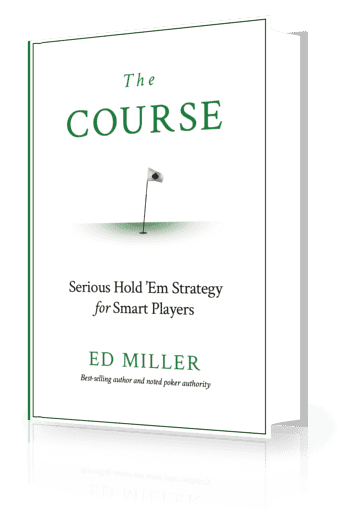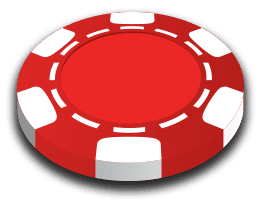
There are tons of great poker books on the market… and you’ve written a fair share of them! Why does the world need another poker book, what is it about this book that sets it apart?
Ed Miller: Poker instruction often comes in fragmented bits and pieces. I’ve written books, for instance, on hand reading and on exploiting ABC players, and on hand analysis. But what’s been lacking in my books and often in the literature in general is a sense of the big picture. “How do I piece all these ideas together into a cohesive, winning strategy?” is a question I get a lot from students, and that’s the question The Course sets out to answer.
What kind of poker player is The Course targeted to?
The Course is targeted toward live players–primarily cash, but also useful for tournament players–who aren’t quite “there” yet. What “there” means is subjective, but if you play 1-2 through 5-10 as your regular game, and you don’t consistently feel like the best player at the table, the book is probably for you.
The underlying analogy of “The Course” is a fundamental concept to golfers: “Forget your opponents, always play the course.” Can you expand on why you chose this theme and how it applies to playing one’s best poker?
A huge hangup for many of my students–and for poker players in general–is what’s happening with their opponents. “Jim Bob plays junk hands preflop, but here he is up three buy-ins. What the heck?” Or, “Every time I show a hand down, Bill’s gotta tell me all the mistakes I made. Should I listen to him?” If you want to succeed at poker, one of the first things you have to do is learn to tune all of this extraneous information out. Who’s winning or losing today, and how many junk hands they play preflop, is irrelevant. All the strategy talk at the table is pure noise. You want to ignore all that and just focus on playing your game against the course. The course, in poker, is created by the strategies your opponents play–you want to construct counter-strategies to their strategies. So you want to focus on your opponents’ strategies, but ignore almost everything else about them.
The course, in poker, is created by the strategies your opponents play–you want to construct counter-strategies to their strategies. So you want to focus on your opponents’ strategies, but ignore almost everything else about them.
The Course introduces fundamental skills, and then builds on those skills as the player moves up in level. Can you give us a specific example of a more advanced concept from later in your book, and how it builds off a more fundamental concept introduced earlier on?
Skill #2 in the book, one of the most fundamental skills, is not to pay people off. At the $1-$2 and $2-$5 levels, when most players make big bets on the turn and river, it means they have the hand they’re representing, and you shouldn’t pay to see it. But later on, Skill #6 in the book talks about making live reads, and one of the big ones is how to interpret bet-sizing tells. This section refines the advice in Skill #2. What exactly constitutes a “big” bet that you should give credit and fold to, and what bets actually imply a weakness that you should attack? That’s what Skill #6 is about, and while you can do fine in $1-$2 games with just Skill #2, you’ll need the refinement if you want to thrive at $2-$5 and especially $5-$10.
In your opinion, how much time should poker players be spending studying the game vs. playing the game, and does that ratio ever change depending on skill level?
I think it’s personal how you split that time. I’d say you should study as much as you can and still feel like you enjoy it. The #1 goal is not to get burnt out. But if you can study and study and then come back the next day and study more, then that’s great. Though I guess if you are using more than 50% of your poker time to study and not play, maybe at that point it gets a little ridiculous.
A big theme of your work seems to be “cutting through the noise” to deliver “ruthlessly practical” advice. Strategy-wise, what are some of the top culprits in distracting poker players from playing their A-game?
People get way too hung up on coolers and other black swan-type hands. When people bring me hands to discuss, I see A-A versus K-K or K-K versus Q-Q way more frequently than these matchups occur in real life. “Could I have gotten away,” they ask. Honestly, I don’t care. Performing optimally in A-A versus K-K hands is not the skill that’s going to make someone a professional-level player. Or they focus on really weird betting patterns. “This guy bet one-quarter pot on the flop, and then check-raised the turn for three times the pot, and then checked the river. What does that mean?” Gee, I don’t know. But again, I don’t care, because there’s no lasting skill to being good in pots where people bet tiny on the flop, make a massive turn check-raise, and then check the river. The Course is designed to steer you away from worrying about all these scenarios that don’t impact your long-term bottom line and toward all the most critical no-limit skills you will rely on day in and day out.
One thing you teach readers is that successful poker players never stop learning. What did you learn about poker from writing this book?
I developed a simple framework for describing where money comes from. First, people play too many hands preflop. This leaves them with too many weak hands after the flop. And they have to dispose of these weak hands one of three ways–they can call down with them, they can fold them, or they can try to bluff with them. If you can predict which of the three ways your opponent is likely to employ in any given pot, you can quickly develop a counter-strategy that gets the money. I’d never thought about the game quite like this before writing the book, and I find it a very useful framework to make real decisions when I play nowadays.
Now that you’ve written the definitive NLHE book, what’s next for Ed Miller?
I’m going to focus more on making videos for Red Chip Poker, and I’m looking into expanding the range of media I use for poker instruction, from audio (and audiobooks), to video, to interactive, and perhaps also to seminars, webinars, and other live teaching opportunities.


Do I have to buy Ed Millers book from Amazon? I’m trying to get an epub (preferably) direct from his website but his website doesn’t seem to exist anymore. Can anyone point me in the right direction? Thanks.
If you’re specifically trying to avoid Amazon I’d suggest biblio.com